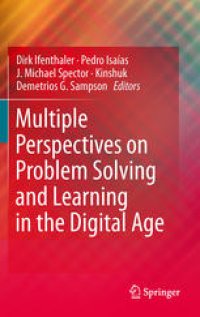
Ebook: Multiple Perspectives on Problem Solving and Learning in the Digital Age
- Tags: Educational Technology, Educational Psychology, Learning & Instruction
- Year: 2011
- Publisher: Springer-Verlag New York
- Edition: 1
- Language: English
- pdf
Multiple Perspectives on Problem-Solving and Learning in the Digital Age Dirk Ifenthaler, Kinshuk, Pedro Isaias, Demetrios G. Sampson, J. Michael Spector, editors Have computers made problem-solving easier? The answer is a resounding yes and no: while we can access more information and increasingly sophisticated search engines, problems themselves are more complicated, and often more vague. Accordingly, new strategies for teaching problem-solving should be technologically astute, engage learners, and encourage progressive development of skills. The perspectives represented in Multiple Perspectives on Problem-Solving and Learning in the Digital Age include instructional design, cognition, assessment, schooling/teaching, and virtual environments, with emphasis on technologies that not only promote problem-solving, but also address new problems created by rapidly changing technology. Innovative new tools such as MAPLET (a learner-focused framework for integrating technology into curricula), the virtual learning environment ViCaDiS, and interactive online museum exhibits demonstrate the complex nature of problem-solving and the diverse ways in which learners—and instructors—achieve expertise. A sampling of the topics covered: • Pedagogical usability issues in Web-based learning objects. • Collaborative cognitive tools for shared representation. • Automated measurement of critical thinking for discussion forum participants. • Expanding global awareness with virtual collaboration. • Simulation games as learning experience. • Beyond teaching and learning: the human development paradigm. Multiple Perspectives on Problem-Solving and Learning in the Digital Age re-draws the boundaries of curriculum design and distributed knowledge. This volume will be a welcome addition to education libraries, and a forward-looking reference for academics and professionals in the field of technology integration in learning and instruction.
Multiple Perspectives on Problem-Solving and Learning in the Digital Age Dirk Ifenthaler, Kinshuk, Pedro Isaias, Demetrios G. Sampson, J. Michael Spector, editors Have computers made problem-solving easier? The answer is a resounding yes and no: while we can access more information and increasingly sophisticated search engines, problems themselves are more complicated, and often more vague. Accordingly, new strategies for teaching problem-solving should be technologically astute, engage learners, and encourage progressive development of skills. The perspectives represented in Multiple Perspectives on Problem-Solving and Learning in the Digital Age include instructional design, cognition, assessment, schooling/teaching, and virtual environments, with emphasis on technologies that not only promote problem-solving, but also address new problems created by rapidly changing technology. Innovative new tools such as MAPLET (a learner-focused framework for integrating technology into curricula), the virtual learning environment ViCaDiS, and interactive online museum exhibits demonstrate the complex nature of problem-solving and the diverse ways in which learners—and instructors—achieve expertise. A sampling of the topics covered: • Pedagogical usability issues in Web-based learning objects. • Collaborative cognitive tools for shared representation. • Automated measurement of critical thinking for discussion forum participants. • Expanding global awareness with virtual collaboration. • Simulation games as learning experience. • Beyond teaching and learning: the human development paradigm. Multiple Perspectives on Problem-Solving and Learning in the Digital Age re-draws the boundaries of curriculum design and distributed knowledge. This volume will be a welcome addition to education libraries, and a forward-looking reference for academics and professionals in the field of technology integration in learning and instruction.